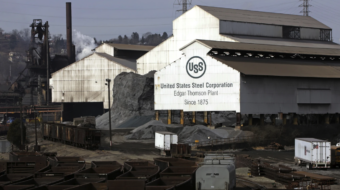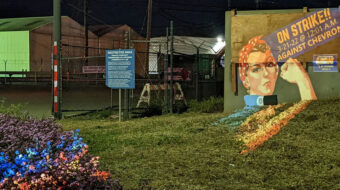PITTSBURGH – Fresh from a Dec. 7 victory in bankruptcy court giving them a temporary stay in the battle to prevent LTV Steel Corporation from liquidating facilities in Ohio and Indiana, rank-and-file members of the United Steelworkers of America (USWA) are packing their winter camping gear and heading for Washington, DC. There they will conduct a last ditch effort to force Congress to unlock $250 million in emergency loans for LTV; they have until Dec. 19.
At stake are a finishing mill, and a number of blast furnaces and coke ovens throughout the Great Lakes region.
The battle to preserve the jobs of 6,000 steelworkers and the health care benefits of 70,000 retirees as well as the communities in which they live, reached a decisive stage in the Youngstown, Ohio courtroom of Judge William Budoh. On Dec. 7, Budoh signed onto an agreement forged by the USWA and LTV’s unsecured creditors that continued all provisions of the union contract until December 19, and puts the mills on “hot idle” until Feb. 28.
Budoh’s order prevents LTV from destroying the machinery or liquidating its properties without first giving the USWA and the unsecured creditors a final opportunity to petition Congress for help.
In the end LTV stood alone, deserted even by Ohio’s Republican Gov. Bob Taft, who, together with Indiana Gov. Frank O’Bannon, a Democrat, became what the USWA said were “powerful allies in our fight.”
Key to the victory was the unprecedented unity between the USWA, elected officials, communities and LTV’s unsecured creditors which forced open a “window of opportunity” that temporarily saved the union’s contract while buying time to obtain federal assistance.
“Our union’s tenacity and the unrelenting support of elected officials at every level of government have given our members and the communities they live in a ray of hope for saving a company whose steel making capacity has been systematically undermined by its top management,” said Dave McCall, USWA director in Ohio.
All production has ceased at plants in Cleveland and Warren, Ohio, East Chicago, Ind., and Hennepin, Ill. Orders for raw materials were cancelled in August. The company’s Asset Protection Plan calls for the blast furnaces to be “hot idled,” kept barely warm enough to resume production should a buyer be found. Coke ovens, on the other hand, are slated for cold idling. Once cooled, they crumble and die.
But Bodoh ordered the company to “toast” whatever coal was on the ground, thus extending the life of the coke facilities for a few more weeks. The company was ordered to continue making iron until it exhausts raw materials on hand and then go into hot idle until the end of February. This schedule applies to the finishing plant at Hennepin as well.
Given the “window of opportunity” provided in the extended period of “hot idle” ordered by Judge Budoh, the entire community is springing into action to save LTV’s Cleveland facility as a source of income for its workers and taxes for the community. All options are on the table, community and union leaders are saying, including public ownership of the mill if no buyer is found.
City officials are exploring action which could be taken to acquire ownership of the mill by eminent domain. Steelworkers on the mill floor and at recent rallies in Youngstown spoke of public ownership as possibly the only way left to save steel manufacturing in Cleveland and the country.
The USWA is asking its supporters to contact their congressional representatives and urge them to grant the federal loan guarantees as provided for in the Byrd Bill.
Wally Kaufman contributed to this article.












Comments